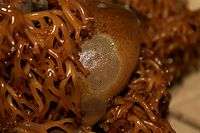Macrocystis integrifolia
| Macrocystis integrifolia | |
|---|---|
 | |
| Macrocystis integrifolia | |
| Scientific classification | |
| (unranked): | SAR |
| Superphylum: | Heterokonta |
| Class: | Phaeophyceae |
| Order: | Laminariales |
| Family: | Laminariaceae |
| Genus: | Macrocystis |
| Species: | M. pyrifera |
| Binomial name | |
| Macrocystis integrifolia Bory de Saint-Vincent 1826[1] | |
| Synonyms | |
|
Macrocystis pyrifera (Linnaeus) C. Agardh[2] | |
Macrocystis integrifolia is one of four species of kelp (large brown algae) in the genus Macrocystis which grows to about 6 metres (20 ft) long.
Description
Deep brown color on flattened rhizomes which are profusely dichotomously branched. Each is attached by branched root-like structures coming out of the sides of the rhizomes. Slender main stipes (about 1 centimetre (0.39 in) wide to 30 metres (98 ft) long) come from the rhizome which is up to 0.1 metres (3.9 in) at the widest. Periodically 5 centimetres (2.0 in) wide and 35 centimetres (14 in) long flattened leaf-like branches derive from the stipe. They have furrowed surfaces and taper gradually, but then have an oval or rounded float where attached to the stipe. The blade-like branches have notched denticulate edges leading to the terminal blade at the tip of the stipe, which is separated by several smaller branches.[3]
Life history
It is found on intertidal rocks or shallow subtidal rocks along the Pacific coast of North America from (British Columbia to California).[2][4][5] It prefers water about 7 metres (23 ft) to 10 metres (33 ft) deep and exposed to the open sea and normal salinities, yet sheltered from full wave action.[6]
Macrocystis integrifolia alternates heteromorphic phases from a macroscopic sporophyte to dioecious microscopic gametophytes.[5] It has been studied as a plant fertilizer, increasing bean yields up to 24% and chemical studies indicate presence of phytohormone-like substances.[7]
In 2009, a study determined that this and Macrocystis pyrifera may be the same species.[8]
External links
- Macrocystis integrifolia Bory California Biota Home Page... Protoctista... Phaeophyta
References
- ↑ Bory de Saint-Vincent, J.B.G.M. (1826). Macrocyste. In: Dictionnaire Classique d'Histoire Naturelle. (Audouin, I. et al. Eds) Vol. 10, pp. 8-10. Paris:
- 1 2 Guiry, M.D. & Guiry, G.M., AlgaeBase: Species: Macrocystis integrifolia, National University of Ireland, Galway. Retrieved 7 February 2013.
- ↑ Phylum: Phaeophyta, Class: Phaeophyceae, Order: Laminariales, Family: Lessoniaceae, Macrocystis integrifolia (Bory), Pearson College UWC. Retrieved 6 February 2013
- ↑ Abbott, I. A. & G. J. Hollenberg. (1976) Marine Algae of California. California: Stanford University Press. ISBN 0-8047-0867-3
- 1 2 Macrocystis integrifolia Bory, DeCew's Guide to the Seaweeds of British Columbia, Washington, Oregon, and Northern California, Center for Phycological Documentation, University Herbarium, University of California, Berkeley, 2002. 13 July 2007
- ↑ The Race Rocks Taxonomy, Macrocystis integrifolia, Pearson College UWC. Retrieved 6 February 2013
- ↑ Temple, W. D., A. A. Bomke, Effects of kelp (Macrocystis integrifolia and Ecklonia maxima) foliar applications on bean crop growth, Plant and Soil, June 1989, Volume 117, Issue 1, pp. 85-92 (paywall)
- ↑ Demes, K.W, Graham, M.H. & Suskiewicz, T.S. (2009). Phenotypic plasticity reconciles incongruous molecular and morphological taxonomies: the giant kelp, Macrocystis (Laminariales, Phaeophyceae), is a monospecific genus (note). Journal of Phycology 45(6): 1266-1269.
| Wikimedia Commons has media related to Macrocystis integrifolia. |